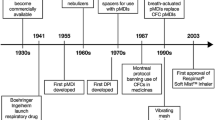Abstract
Background Challenges in recruiting patients at the pharmacy counter for cognitive services have been observed, hampering development in this area. To overcome this barrier, insight into the patient perspective is crucial to understanding their lack of appreciation of the services. However, very few studies have been conducted so far to explore why patients accept or decline offers of cognitive services at the pharmacy counter. Objective To explore patients’ reasons for accepting a particular cognitive service (the Inhaler Technique Assessment Service) a service intended to detect inhalation technique errors. The service is reimbursed by the Danish state and takes approximately 10 min. Setting Ten community pharmacies located in different regions of Denmark, including the center and suburbs of Copenhagen. Method Two types of interviews were conducted: long and short semi-structured interviews with 24 patients suffering mainly from asthma and COPD. Researchers from Copenhagen University conducted 11 long interviews and pharmacy internship students from Copenhagen University carried out 13 short interviews. The interviews were analyzed using descriptive analysis. Main outcome measure Patients’ perceived needs of an inhalation counseling service as well as their motivation for accepting the service, including their accounts of how the service was orally offered by staff. Results The majority of participants were used to using inhaler devices. The participants felt, for several reasons, little need of an inhaler service and seldom noticed the precise way the service was offered. Patients did not seem to accept the service expecting personal benefits. First timers appeared to accept the service to learn how to use the device correctly, whereas experienced users appeared to accept the ITAS to be helpful to staff or to learn more about health issues in general or were convinced by individual employees who showed a special interest in the participant receiving the service. Privacy problems were felt by several participants. Conclusion The patients felt little need for the inhaler counseling service. Patients however accepted the service for various reasons of which the feeling how staff showing an interest in helping them seemed especially convincing.
Similar content being viewed by others
References
Latif A, Pollock K, Boardman H. Why do patients accept or decline the invitation for a medicines use review. Int J Pharm Pract. 2010;18:21.
Herborg H, Soendergaard B, Froekjaer B, Fonnesbaek L, Jorgensen T, Hepler CD, Grainger-Rousseau TJ, Ersboell BK. Improving drug therapy for patients with asthma—part 1: patient outcomes. J Am Pharm Assoc. 2001;41(4):539–50.
Mangiapane S, Schulz M, Mühlig S, Ihle P, Schubert I, Waldmann HC. Community pharmacy-based pharmaceutical care for asthma patients. Ann Pharmacother. 2005;39(11):1817–22.
Kaae S, Traulsen JM, Søndergaard B, Haugbølle LS. The relevance of political prestudies for implementation studies of cognitive services in community pharmacies. Res Social Adm Pharm. 2009;5(2):189–94.
Naik-Panvelkar P, Saini B, Lemay KS, Emmerton LM, Stewart K, Burton DL, Bosnic-Anticevich SZ, Krass I, Smith LD, Armour CL. A pharmacy asthma service achieves a change in patient responses from increased awareness to taking responsibility for their asthma. Int J Pharm Pract. 2015;23:182–1916.
Royal Pharmaceutical Scociety. Support for New Medicine Service. 2015. http://www.rpharms.com/nhs-community-pharmacy-contract-england/new-medicine-service.asp. Cited 4 May 2015.
Emmerton LM, Smith L, Lemay KS, Krass I, Saini B, Bonic-Anticevich SZ, reddel HK, Burton DL, Stewart K, Armour CL. Experiences of community pharmacists involved in the delivery of a specialist asthma service in Australia. BMC Health Serv res. 2012;12:164.
Kaae S, Nørgaard LS. How to engage experienced medicine users at the counter for a pharmacy-based asthma inhaler service. Int J Pharm Pract. 2012;20:99–106.
Danmarks Apotekerforening. Tjek på inhalation. 2015. http://www.apotekerforeningen.dk/apoteket-i-sundhedssektoren/~/media/Apotekerforeningen/sundhedsydelser/fakta_tjek_inhalation.ashx. Cited 10 Feb 2015.
Pound P, Britten N, Morgan M, Yardley L, Pope C, Daker-White G, et al. Resisting medicines: a synthesis of qualitative studies of medicine taking. Soc Sci Med. 2005;61:133–55.
Flick U. An introduction to qualitative research. London: Sage; 2002.
Cavaco AM, Sousa Dias JP, Bates IP. Consumers’ perceptions of community pharmacy in Portugal: a qualitative exploratory study. Pharm World Sci. 2005;27:54–60.
Assa-Eley M, Kimberlin CL. Using interpersonal perception to characterize pharmacists’ and patients’perceptions of the benefits of pharmaceutical care. Health Commun. 2005;17:41–56.
Abukres SH, Hoti K, Hughes JD. Patient attitudes towards a new role for pharmacists: continued dispensing. Patient Prefer Adherence. 2014;8:1143–51.
Saramunee K, Krska J, Mackridge A, Richards J, Suttajit S, Phillips-Howard P. How to enhance public service utilization in community pharmacy? general public and health providers’ perspectives. Res Social Adm Pharm. 2014;10(2):272–84.
Tucker R, Stewart D. Why people seek advice from community pharmacy about skin problems. Int J Pharm Pract. 2015;23(2):150–2.
Peremans L, Verhoeven V, Phillips H, Denekens J, Van Royen P. How does a belgian care provider deal with a request for emergency contraception? Eur J Contracept Reprod Health Care. 2007;12(4):317–25.
Panvelkar NP, Armour C, Saini B. Community pharmacy-based asthma services—what do patients prefer? J Asthma. 2010;47(10):1085–93.
Acknowledgments
The authors would like to thank Asmah Barzak, Kristine Aarup Hallberg Friis, Katrine Kanne, Somia Mohammad, Rikke Rishøj and Joanna Sadiq for their contributions in connection with conducting interviews during their pharmacy internship.
Funding
Actavis granted 20.000 DKr. for expenses of the study, i.e., transcriptions of interviews and presents for participants.
Conflicts of interest
The authors declare no conflict of interest.
Author information
Authors and Affiliations
Corresponding author
Rights and permissions
About this article
Cite this article
Kaae, S., Sporrong, S.K. Patients’ reasons for accepting a free community pharmacy asthma service. Int J Clin Pharm 37, 917–924 (2015). https://doi.org/10.1007/s11096-015-0142-z
Received:
Accepted:
Published:
Issue Date:
DOI: https://doi.org/10.1007/s11096-015-0142-z




